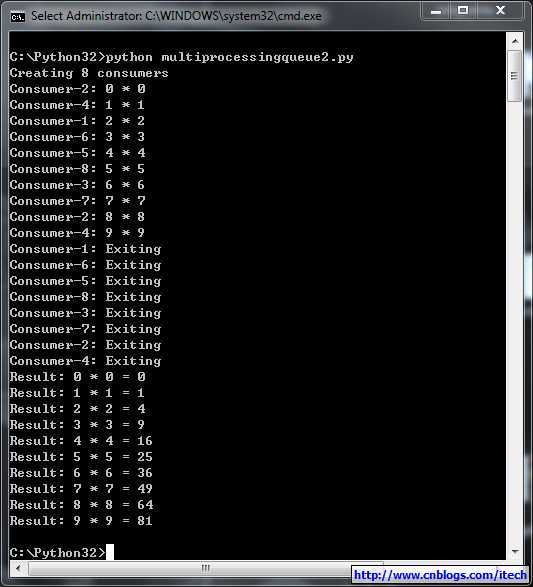标签:blog http 使用 文件 width os
多进程通信
queue和pipe的区别: pipe用来在两个进程间通信。queue用来在多个进程间实现通信。 此两种方法为所有系统多进程通信的基本方法,几乎所有的语言都支持此两种方法。
1)Queue & JoinableQueue
queue用来在进程间传递消息,任何可以pickle-able的对象都可以在加入到queue。
multiprocessing.JoinableQueue 是 Queue的子类,增加了task_done()和join()方法。
task_done()用来告诉queue一个task完成。一般地在调用get()获得一个task,在task结束后调用task_done()来通知Queue当前task完成。
join() 阻塞直到queue中的所有的task都被处理(即task_done方法被调用)。
代码:

import multiprocessing
import time
class Consumer(multiprocessing.Process):
def __init__(self, task_queue, result_queue):
multiprocessing.Process.__init__(self)
self.task_queue = task_queue
self.result_queue = result_queue
def run(self):
proc_name = self.name
while True:
next_task = self.task_queue.get()
if next_task is None:
# Poison pill means shutdown
print (‘%s: Exiting‘ % proc_name)
self.task_queue.task_done()
break
print (‘%s: %s‘ % (proc_name, next_task))
answer = next_task() # __call__()
self.task_queue.task_done()
self.result_queue.put(answer)
return
class Task(object):
def __init__(self, a, b):
self.a = a
self.b = b
def __call__(self):
time.sleep(0.1) # pretend to take some time to do the work
return ‘%s * %s = %s‘ % (self.a, self.b, self.a * self.b)
def __str__(self):
return ‘%s * %s‘ % (self.a, self.b)
if __name__ == ‘__main__‘:
# Establish communication queues
tasks = multiprocessing.JoinableQueue()
results = multiprocessing.Queue()
# Start consumers
num_consumers = multiprocessing.cpu_count()
print (‘Creating %d consumers‘ % num_consumers)
consumers = [ Consumer(tasks, results)
for i in range(num_consumers) ]
for w in consumers:
w.start()
# Enqueue jobs
num_jobs = 10
for i in range(num_jobs):
tasks.put(Task(i, i))
# Add a poison pill for each consumer
for i in range(num_consumers):
tasks.put(None)
# Wait for all of the tasks to finish
tasks.join()
# Start printing results
while num_jobs:
result = results.get()
print (‘Result:‘, result)
num_jobs -= 1

注意小技巧: 使用None来表示task处理完毕。
运行结果:

2) pipe
pipe()返回一对连接对象,代表了pipe的两端。每个对象都有send()和recv()方法。
代码:
from multiprocessing import Process, Pipe
def f(conn):
conn.send([42, None, ‘hello‘])
conn.close()
if __name__ == ‘__main__‘:
parent_conn, child_conn = Pipe()
p = Process(target=f, args=(child_conn,))
p.start()
p.join()
print(parent_conn.recv()) # prints "[42, None, ‘hello‘]"
3)Value + Array
Value + Array 是python中共享内存 映射文件的方法,速度比较快。
from multiprocessing import Process, Value, Array
def f(n, a):
n.value = n.value + 1
for i in range(len(a)):
a[i] = a[i] * 10
if __name__ == ‘__main__‘:
num = Value(‘i‘, 1)
arr = Array(‘i‘, range(10))
p = Process(target=f, args=(num, arr))
p.start()
p.join()
print(num.value)
print(arr[:])
p2 = Process(target=f, args=(num, arr))
p2.start()
p2.join()
print(num.value)
print(arr[:])
# the output is :
# 2
# [0, 10, 20, 30, 40, 50, 60, 70, 80, 90]
# 3
# [0, 100, 200, 300, 400, 500, 600, 700, 800, 900]
参考:
The Python Standard Library By Example
http://www.doughellmann.com/PyMOTW/multiprocessing/communication.html
完!
python类库32[多进程通信Queue+Pipe+Value+Array],布布扣,bubuko.com
python类库32[多进程通信Queue+Pipe+Value+Array]
标签:blog http 使用 文件 width os
原文地址:http://www.cnblogs.com/L-H-R-X-hehe/p/3815349.html
